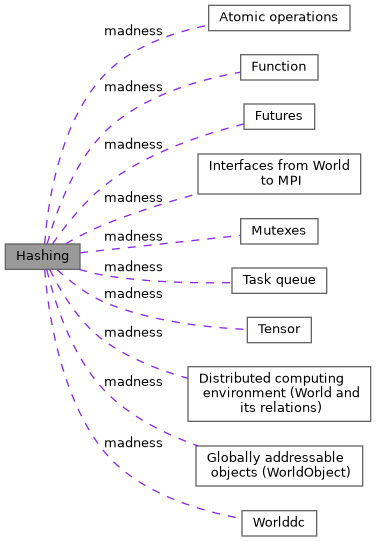
Namespaces | |
| namespace | madness |
| Namespace for all elements and tools of MADNESS. | |
Functions | |
| uint32_t | hashlittle (const void *key, size_t length, uint32_t initval) |
| uint32_t | hashword (const uint32_t *k, size_t length, uint32_t initval) |
Detailed Description
MADNESS uses hashing functions are modeled after Boost.Functional/Hash. It has many similar function calls including hash_value, hash_combine, and hash_range. In addition, it is also compatible with C++ TR1 hashing functors. The madness::Hash functor interface is identical to both boost::hash and std::hash , and any one of these may be used. By default, MADNESS hashing functions can hash all fundamental types including integral types, floating point types, pointer types, std::string, std::wstring, and std::array. Presently hashT is typedef to std::size_t .
Since having a good hash is important, we are using Bob Jenkin's "lookup v3" hash from http://www.burtleburtle.net/bob/c/lookup3.c. The preferred interface for these function is with the madness::Hash<T> functor, but you can also use hash_value or the "lookup v3" interface directly.
Note: Bob Jenkin's "lookup v3" hash returns a uint32_t hash value, which is cast to std::size_t. This is done for compatibility with std::hash.
WARNING: While both std::hash and madness::Hash have the same interface, they will not generate the same hash values from the same key value.
MADNESS hashing consists of one functor and three functions
madness::Hashis the hash functor and the primary interface for hashinghash_value()is for hashing a single value and is the function used by the Hash functorhash_range()is for hashing a group of values. You can use this function to hash an iterator range, a C-style array, or a pointer.hash_combine()hashs a given value and combines it with a seed. This is useful for combining multiple elements into a single hash value.
There are several options for creating and using hash functions for your custom types. The easiest method is to define a hash_value function for your key type in the same namespace. This function will automatically be used by MADNESS hashing containers. The hashing function should have the following form.
If your object is in the madness namespace, you may also use the intrusive method and define a hash member function for your key.
You can create a specialization of madness::Hash for your type directly.
If you use any of the above methods, MADNESS hash_combine and hash_range functions will be able to hash your custom types.
In addition to these methods, you can use std::hash, boost::hash, or create your own custom hashing functor that has the same form as madness::hash. However, if you want to use a hashing functor other than madness::Hash, you will need to provide the appropriate template parameter to the hashing container.
Function Documentation
◆ hashlittle()
| uint32_t hashlittle | ( | const void * | key, |
| size_t | length, | ||
| uint32_t | initval | ||
| ) |
References a, b, c, HASH_LITTLE_ENDIAN, k, length, mix, and u().
Referenced by madness::hash_range(), and madness::hash_value().
◆ hashword()
| uint32_t hashword | ( | const uint32_t * | k, |
| size_t | length, | ||
| uint32_t | initval | ||
| ) |
References a, b, c, k, length, and mix.
Referenced by madness::hash_range(), and madness::hash_value().